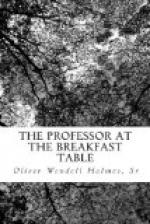And what of Philadelphia?—said the Marylander.
Oh, Philadelphia?—Waterworks,—killed by the Croton and Cochituate; —Ben Franklin,—borrowed from Boston;—David Rittenhouse,—made an orrery;—Benjamin Rush,—made a medical system;—both interesting to antiquarians;—great Red-river raft of medical students,—spontaneous generation of professors to match;—more widely known through the Moyamensing hose-company, and the Wistar parties;-for geological section of social strata, go to The Club.—Good place to live in,—first-rate market,—tip-top peaches.—What do we know about Philadelphia, except that the engine-companies are always shooting each other?
And what do you say to New York?—asked the Koh-i-noor.
A great city, Sir,—replied the Little Gentleman,—a very opulent, splendid city. A point of transit of much that is remarkable, and of permanence for much that is respectable. A great money-centre. San Francisco with the mines above-ground,—and some of ’em under the sidewalks. I have seen next to nothing grandiose, out of New York, in all our cities. It makes ’em all look paltry and petty. Has many elements of civilization. May stop where Venice did, though, for aught we know.—The order of its development is just this:—Wealth; architecture; upholstery; painting; sculpture. Printing, as a mechanical art,—just as Nicholas Jepson and the Aldi, who were scholars too, made Venice renowned for it. Journalism, which is the accident of business and crowded populations, in great perfection. Venice got as far as Titian and Paul Veronese and Tintoretto,—great colorists, mark you, magnificent on the flesh-and-blood side of Art,—but look over to Florence and see who lie in Santa Crocea, and ask out of whose loins Dante sprung!
Oh, yes, to be sure, Venice built her Ducal Palace, and her Church of St. Mark, and her Casa d’ Or, and the rest of her golden houses; and Venice had great pictures and good music; and Venice had a Golden Book, in which all the large tax-payers had their names written;—but all that did not make Venice the brain of Italy.
I tell you what, Sir,—with all these magnificent appliances of civilization, it is time we began to hear something from the djinnis donee whose names are on the Golden Book of our sumptuous, splendid, marble-placed Venice,—something in the higher walks of literature, —something in the councils of the nation. Plenty of Art, I grant you, Sir; now, then, for vast libraries, and for mighty scholars and thinkers and statesmen,—five for every Boston one, as the population is to ours,—ten to one more properly, in virtue of centralizing attraction as the alleged metropolis, and not call our people provincials, and have to come begging to us to write the lives of Hendrik Hudson and Gouverneur Morris!
—The Little Gentleman was on his hobby, exalting his own city at the expense of every other place. I have my doubts if he had been in either of the cities he had been talking about. I was just going to say something to sober him down, if I could, when the young Marylander spoke up.




